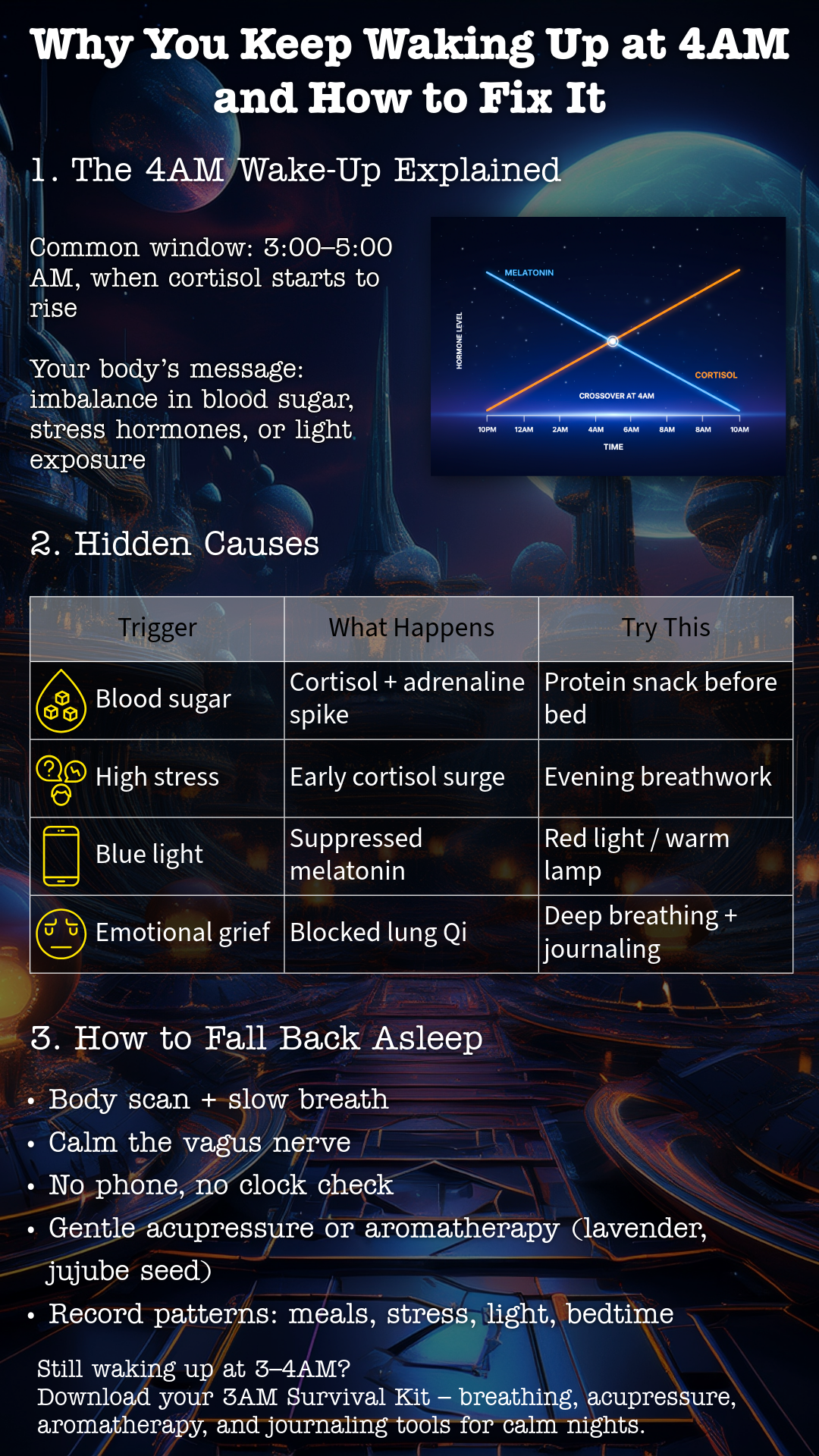What to Do If You Wake Up at 4AM Every Day: Understanding the Causes and Solutions
Published on August 4, 2025

Waking at 4AM isn’t random
If you wake up alert between 3–5 AM while the rest of the world sleeps, it can feel unsettling. But this pattern is surprisingly common — and often a meaningful signal from your body, not a failure on your part.
Your body may be protecting you
Early-morning wake-ups are frequently linked to blood sugar drops, stress-driven cortisol shifts, or subtle light exposure. These mechanisms evolved to keep you safe — but modern life can trigger them at the wrong time.
You may recognize these patterns
Waking at the same hour every night, feeling suddenly alert, racing thoughts, shallow breathing, or a sense that sleep just ‘won’t return’ even though you’re exhausted.
A deeper view from TCM
From Traditional Chinese Medicine, waking between 3–5 AM is linked to the lungs — the organ of breath, grief, and Qi flow. Unprocessed stress or shallow breathing can quietly surface at night.
What helps most people sleep through
Stabilizing evening blood sugar, lowering stress load during the day, reducing light at night, calming the nervous system, and nourishing Yin with gentle evening rituals.
What to do when you wake at 3–4AM
If you wake up alert in the middle of the night and need a simple, calming response, the 3AM Survival Mini Kit guides you back into sleep in about five minutes — without forcing or overthinking.
Why Am I Waking Up at 4AM? Exploring the Underlying Causes
Waking up at the same early hour every day can be deeply disruptive—and surprisingly common. Many people experience a sudden alertness around 3 to 5 AM, a time that should be reserved for deep rest. But this pattern is rarely random; it’s often a clue from your body and mind that something deeper needs attention.
Let’s explore the most common physiological, psychological, and environmental causes—and more importantly, what you can do about them.

Blood Sugar Fluctuations
Often overlooked, blood sugar regulation plays a key role in sleep continuity. When blood glucose drops during the night, your body may compensate by releasing cortisol and adrenaline, leading to sudden awakenings—often around 4AM.
A 2022 study published in Sleep Medicine Journal found that individuals with more stable nighttime glucose levels experienced significantly fewer mid-sleep awakenings.
If you frequently wake up at the same time, consider reviewing your evening meals and snacks. Heavy carbs followed by rapid glucose drops could be a hidden culprit. A small protein-rich snack (like a handful of nuts) may help stabilize blood sugar before bed.
Stress and Cortisol Rhythms
Chronic stress elevates evening cortisol, which suppresses melatonin and delays sleep onset—but it can also cause abrupt waking. Cortisol levels naturally rise in the early morning, preparing your body to wake. If you're under constant stress, this rise may happen earlier or more intensely than needed.
Emotional stressors, even subconscious ones, can prime your nervous system to stay alert during the night. Keeping your system calm throughout the day is just as essential as nighttime habits.
From a Traditional Chinese Medicine (TCM) perspective: waking between 3–5AM is connected to the activity of the lungs, the organ associated with grief and the flow of Qi. If lung Qi is blocked—by unprocessed emotions, shallow breathing, or a weakened system—nighttime awakenings may follow.
Light Exposure and Melatonin Suppression
Even minimal light exposure—streetlights through a window, a blinking charger, or digital alarm clock—can disrupt melatonin production, the hormone that cues your body for rest. Blue and white light are the most potent suppressors.
We recommend exploring Red Light Therapy in the evening, which mimics sunset hues and supports natural circadian alignment.
Aromatherapy can also help: a few drops of lavender or cedarwood essential oil in a diffuser calm the nervous system and support melatonin pathways.
How to Fall Back Asleep When You Wake Up Too Early

Evening Tea Ritual for Better Sleep
Calm & Sleep Teas | Art of Tea
A caffeine-free blend with chamomile, herbs, and calming botanicals – ideal for winding down before bed or during 3AM wake-ups.
Shop Calm & Sleep TeasInstead of tossing and turning or reaching for your phone (which worsens things), try these mindful techniques to guide yourself gently back into sleep.
Embrace Mindfulness and Body Scanning
This practice helps quiet mental chatter and reconnects you to your physical body. Here’s how:
- Lie still with your eyes closed.
- Bring awareness to your breath—slow it down.
- Mentally scan from head to toe, pausing at each part and softening any tension.
- If thoughts arise, notice them without judgment, and return to your breath.
This is a foundational technique we also explore in Harnessing the Power of Breathwork to Fall Asleep Faster.
Additional Tools to Minimize Awakenings
- Limit caffeine, alcohol, and sugar in the evening to avoid metabolic disruptions.
- Avoid screen exposure at least an hour before bed (see our guide on The Impact of Screens on Melatonin).
- Sleep in a cool, quiet, and completely dark environment—consider blackout curtains and white noise.
If you want personalized strategies, try our Sleep Tips & Gentle Strategies or run your data through the Sleep Test.
Tracking Your Sleep Patterns
To uncover patterns and triggers, we recommend maintaining a simple sleep journal. Record:
- Bedtime and wake-up times
- Meals/snacks, especially within 3 hours of bedtime
- Stress levels and emotional events of the day
- Physical activity
- Screen exposure and evening routine
Over a week or two, trends will emerge—offering valuable insight for sustainable change.
When to Adjust Your Routine
Waking at 4AM might be your body’s cry for a gentler lifestyle rhythm.
Review Your Evening Routine
Are you truly winding down, or are you simply shutting off devices and jumping into bed? A poor evening routine can sabotage even the best intentions. See our full guide: Evening Routines That Lead to Better Sleep.
Incorporate Gentle Relaxation
Start with simple, screen-free rituals:
- Herbal teas like chamomile, passionflower, or TCM-inspired jujube seed tea
- Gentle stretching or yin yoga
- Reading fiction or journaling
- Nature soundscapes or binaural beats
These practices regulate your nervous system and lower late-night cortisol. In TCM terms, they nourish Yin energy, allowing Yang activity to retreat and rest.
Case Study: Finding Serenity Amidst Sleeplessness
During a particularly intense period of my life, I found myself waking like clockwork at 4:11AM. Frustrated and foggy, I turned to a sleep journal. Within a few days, I noticed a consistent pattern: sugary late-night snacks and heightened anxiety. I replaced both with herbal tea and breathwork. Within two weeks, the 4AM awakenings had vanished—and I began waking naturally at 6:30AM, feeling rested.
The transformation wasn't instant, but it was deeply sustainable—and empowering.
Conclusion
Waking up at 4AM may feel frustrating and mysterious, but it’s often your body’s way of asking for balance.
By identifying hidden disruptors—blood sugar shifts, stress hormones, poor light hygiene—you begin the journey toward resolution. Through mindfulness, consistent evening rituals, and sleep-friendly habits, you can gently retrain your system to rest fully through the night.
And if you're still unsure where to begin, let our Sleep Cycle Calculator help you design a bedtime that aligns with your biology.
Extra Resource: The 3AM Survival Kit
If early morning wake-ups continue to disturb your nights, you don’t need to face them unprepared. The 3AM Survival Kit is a practical, compassionate guide designed specifically for those restless hours. Inside, you’ll find:
- Breathing techniques to lower cortisol within minutes
- Gentle stretches and acupressure points inspired by Traditional Chinese Medicine
- Aromatherapy blends that calm the nervous system
- Journaling prompts to clear your mind before sleep returns
Instead of lying awake in frustration, the Survival Kit helps you reclaim peace at 3AM or 4AM—and drift back into deep, restorative sleep. It’s like having a night-time ally by your side whenever your body calls for calm.
Frequently Asked Questions
Martin Lain — Sleep Researcher & Creator of SleepCureAI
Martin Lain combines modern sleep science, circadian-rhythm research, TCM-inspired insights, and AI-based pattern analysis to help people understand their sleep more deeply. His work integrates gentle nighttime rituals, nervous system regulation, and data-driven tools.
Medically Reviewed by
Dr. Mei Lin, DACM – TCM Sleep Medicine Specialist
(Editorial Medical Reviewer Persona)
Dr. Mei Lin is an editorial medical reviewer specializing in Traditional Chinese Medicine. Her expertise focuses on the relationship between Yin–Yang balance, Shen (Heart spirit), Liver Qi regulation, and the Kidney's role in nighttime restoration. Her review ensures that SleepCureAI articles align with foundational TCM sleep principles and classical physiological patterns described in traditional sources.
- Yin deficiency and difficulty sleeping
- Liver Qi stagnation and 1–3AM wake-ups
- Kidney Yin and nighttime restoration
This reviewer profile represents an editorial medical persona used for accuracy review of TCM-related sleep concepts.
Reviewed by SleepCureAI Sleep Engine (Beta)
A machine-learning model trained on circadian rhythm science, Traditional Chinese Medicine sleep physiology, and behavioral sleep optimization frameworks. This system reviews each article for timing accuracy, emotional–physiological coherence, and alignment with safe sleep practices.
- Circadian rhythm consistency
- Nervous system safety & regulation insights
- TCM coherence (Yin–Yang, Liver Qi, Shen)
- Evidence-based lifestyle recommendations
Disclaimer: This AI system does not diagnose medical conditions and does not replace professional care.